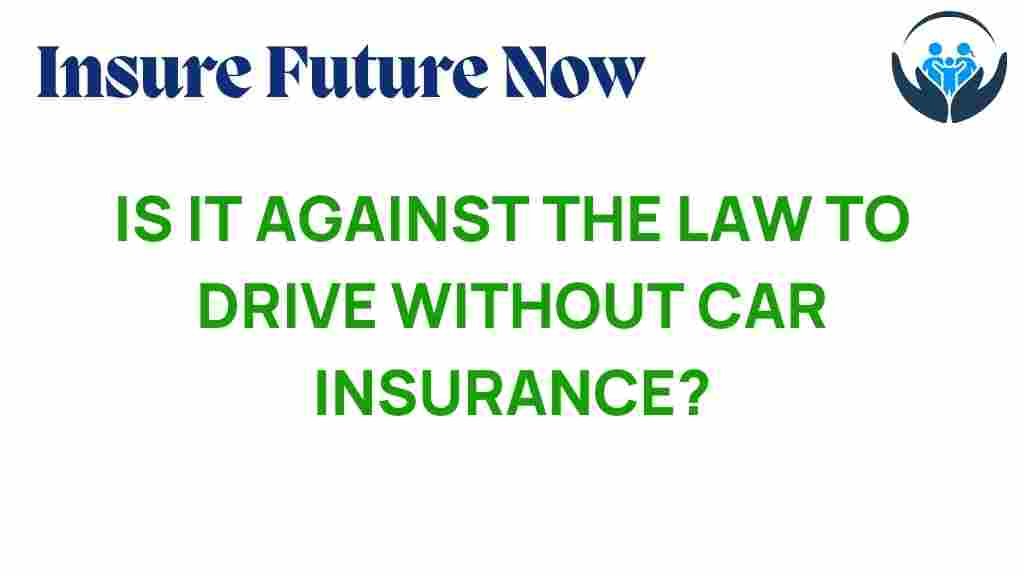Unraveling the Legalities: Is Driving Without Car Insurance Illegal?
When it comes to driving, understanding the legalities surrounding car insurance is crucial. Many drivers often wonder: is it illegal to drive without car insurance? The answer varies significantly depending on the jurisdiction, as different states have different driving laws and insurance requirements. This article will explore the various aspects of car insurance, the implications of driving without it, the penalties for uninsured drivers, and how to ensure compliance with state regulations while promoting road safety.
The Importance of Car Insurance
Car insurance is not just a legal requirement in most states; it serves to protect drivers financially in the event of an accident. Here are some key points about the importance of car insurance:
- Liability Protection: Car insurance provides liability coverage, which is essential in protecting you against claims made by others if you are found at fault in an accident.
- Financial Security: Without insurance, you may face significant financial burdens resulting from accidents, repairs, medical expenses, and legal fees.
- Peace of Mind: Having the right coverage allows you to drive confidently, knowing that you are protected against unforeseen events.
Understanding State Regulations
Each state in the U.S. has its own set of regulations regarding car insurance. While most states require drivers to carry a minimum level of coverage, some states have more lenient laws. Here’s a breakdown of how various states regulate insurance requirements:
- Mandatory Insurance States: Most states, including California, Texas, and New York, require drivers to have at least liability insurance.
- No-Fault Insurance States: States like Florida and Michigan have no-fault insurance laws, meaning that your own insurance pays for your injuries regardless of who caused the accident.
- Uninsured Motorist Coverage: Some states require drivers to carry uninsured motorist coverage to protect against accidents caused by uninsured drivers.
The Legalities of Driving Without Car Insurance
Driving without car insurance is illegal in most states. The legal consequences of being caught driving without insurance can be severe. Here’s what you need to know:
- Penalties: Penalties for driving without insurance can include fines, license suspension, and even vehicle impoundment.
- Legal Fees: If involved in an accident without insurance, you may incur significant legal fees and be held liable for damages.
- Increased Premiums: Getting caught driving without insurance can lead to increased premiums when you do decide to get coverage.
Penalties for Uninsured Drivers
Understanding the specific penalties you could face as an uninsured driver is crucial to emphasize the importance of having insurance:
- Fines: Depending on the state, fines for driving without insurance can range from $200 to over $1,000.
- License Suspension: Many states may suspend your driver’s license for a period if you are caught driving without insurance.
- Community Service: Some jurisdictions may require offenders to complete community service hours.
- SR-22 Requirement: You may be required to file an SR-22 form, which proves that you have insurance, for a specified period.
Coverage Options for Drivers
When it comes to car insurance, it’s vital to understand the various coverage options available to you:
- Liability Coverage: This is often required by law and covers damages to others if you are at fault in an accident.
- Collision Coverage: This covers damages to your vehicle regardless of who is at fault.
- Comprehensive Coverage: This protects your car against non-collision incidents, such as theft or natural disasters.
- Uninsured/Underinsured Motorist Coverage: This provides protection in case you are involved in an accident with an uninsured driver.
Step-by-Step Process to Ensure Compliance
To avoid the legalities and penalties associated with driving without car insurance, follow these steps to ensure compliance:
- Check State Requirements: Research your state’s specific insurance requirements to understand what coverage you need.
- Shop for Insurance: Compare quotes from multiple insurance providers to find the best coverage for your needs and budget.
- Maintain Continuous Coverage: Avoid gaps in your insurance coverage to prevent legal issues and increased premiums.
- Keep Documentation Handy: Always carry proof of insurance in your vehicle to avoid penalties during traffic stops.
Troubleshooting Common Issues
Even with the best intentions, drivers may encounter issues related to car insurance. Here are some common problems and how to troubleshoot them:
- Lost Insurance Documents: Contact your insurance provider for a reissue of your policy documents.
- Expired Policy: Renew your policy as soon as possible to avoid penalties.
- Rate Increases: If your premiums increase significantly, shop around for better rates or discuss options with your current provider.
Promoting Road Safety
Having adequate car insurance is not just about legal compliance; it’s also about promoting road safety. Here are ways to contribute:
- Educate Others: Share information about the importance of car insurance with friends and family.
- Practice Safe Driving: Always adhere to traffic laws and drive defensively.
- Encourage Insurance Coverage: Advocate for friends and family to get insured, especially those who may not realize its importance.
Conclusion
In summary, driving without car insurance is illegal in most states and carries significant penalties. Understanding the legalities surrounding insurance requirements not only protects you from financial burdens but also enhances road safety for everyone. Make sure to stay informed about your state’s driving laws and ensure you have the necessary coverage to drive legally and safely. For more information on car insurance and finding the right coverage, you can visit Insurance Information Institute for resources and guidance. Remember, being a responsible driver means being insured and prepared for the unexpected.
This article is in the category Policies and created by InsureFutureNow Team
